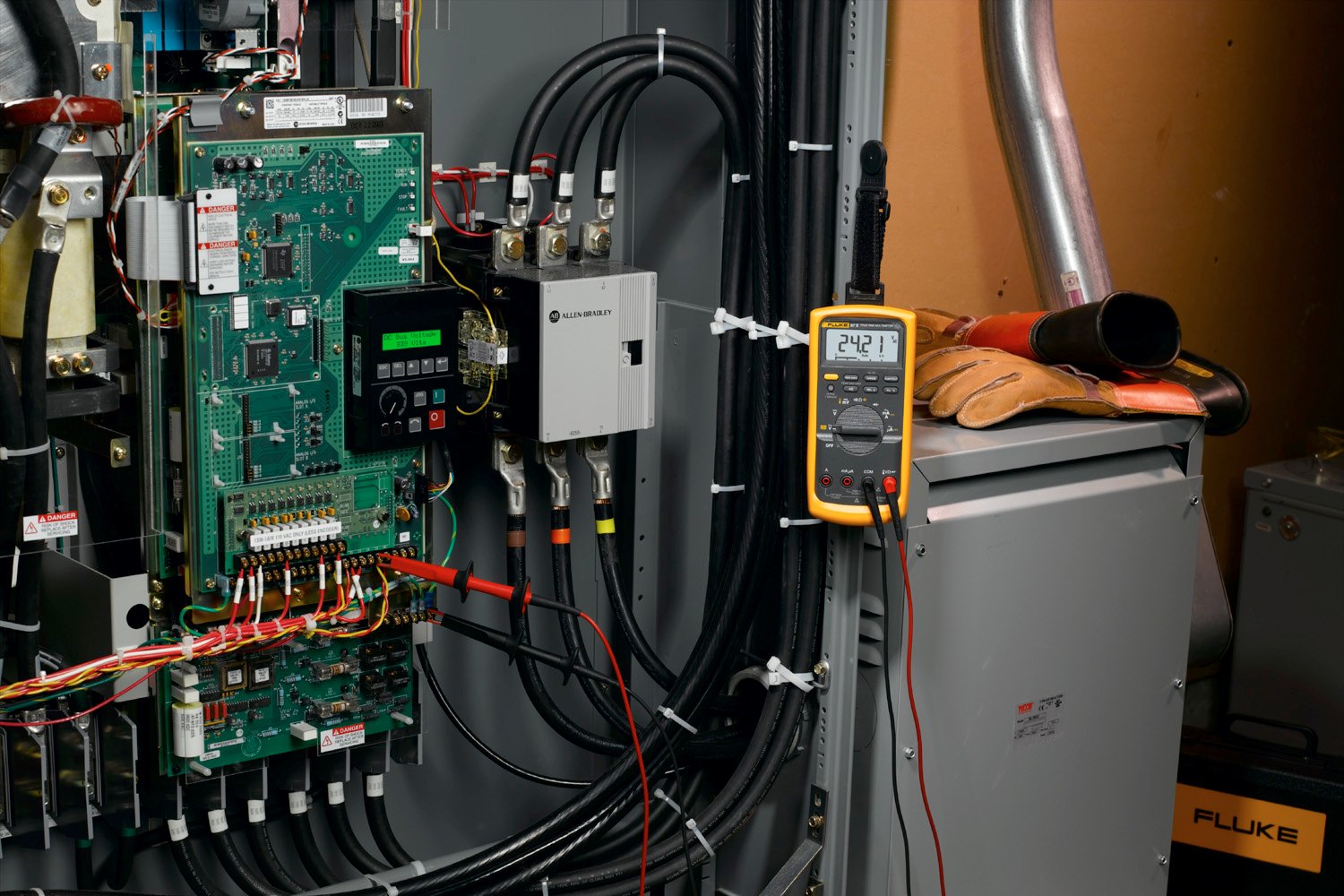只是一个保险丝发火的。对吧?我们知道一个保险丝是由一定程度的电流超过时开放。保护我们免受电击和火灾开始过热的布线。然而,一些保险丝保护我们免受一个更加严重的危险。本文解释的隐患进行电压和电流测量与测试人员没有设计到的熔断保护测试仪,会造成严重的烧伤的危险,甚至死亡。

为什么一个测试人员需要保险丝吗?
市场上有各种各样的测试,从简单的电压探测器到高度复杂的数字万用表。测试人员,使电压测量具有高输入阻抗,使一个过载条件不太可能。因此,电压测量输入通常不会与熔断保护设计,但与过电压保护。但如果还同样的测试的目的是测量电流,融合是必需的。电流测量的输入通常使用一个简单的测量电流分流。这个分流电阻的0.01欧姆。再加上测试引线的电阻(约。0.04欧姆),你有一个短的小于0.1欧姆。这种阻力是足够的,当你把这个和另一个负载测量短串联电路的电流。但它是一个完全不同的故事,当你把这个电路电压源,说你客厅的插头插座。 This is an all too common mistake made by people measuring both voltage and current. After making a current measurement with the test leads in the current input jacks, the user tries to make a voltage measurement forgetting the leads are in the amps jacks. This effectively places a short across the voltage source. Years ago, when analog meters were the only instrument for making these measurements, this mistake pretty well destroyed the meter movement (the needle wrapped around the top peg), not to mention the internal circuitry. To protect against this common occurrence, meter manufacturers started putting a fuse in series with the meter's test lead jacks, for an inexpensive and effective solution for a very simple mistake. Today, most manufacturers still design their testers with fuse protection in the current measuring circuits. As technology has moved forward, the science of fuse design has progressed as well. Although understood by people who build testers, the full impact of fusing is little understood by most tester users. When you make that simple mistake of putting voltage across the current jacks and blow the fuse, you're at first thankful you didn't wipe out the meter. But you may then become annoyed with the fact that you have to hunt up a new fuse and replace it before making your next current measurement. Even more frustrating is when you share meters with other people in your shop and someone else blows a fuse and puts the meter away to have the problem discovered by an unsuspecting user.
什么时候测试人员成为一枚手榴弹?
制造商指定在手册和经常计所需的amerage,更换保险丝的中断和电压等级。如果你选择了一个保险丝没有这些评级,或更糟糕的是,在熔丝连接导线,信不信由你,您刚刚创建了一个热手榴弹。你只需要设置了正确的条件。你可能不会得到爆炸而致力于打印机,电脑,复印机或设备,有自己的供电(CAT)。你甚至可能侥幸在分支电路(猫II)没有设置了。这两个环境是相当低的能源和经常有内置保险丝保护、断路器和过流保护电路。然而,它不是一个好主意,也不是一个安全的工作方式。当你搬到一个电气配电箱(猫III)或主给水管线(猫IV),保护电路显著变化。在配电盘断路器之间你和电力公司在数百安培额定的15日20或30安培分支电路断路器。当测量电压的输入侧断路器面板上居住,保护现在在电线杆或变电站。这些断路器可以携带数千安培在开放和相当大的比一个分支断路器时间开放。当你不小心离开安培千斤顶的领导,把米会在其中一个电压源没有appropriately-fused测试仪,你把你的生活处于严重危险。
等离子体的火球
在这种情况下,短期用错误的保险丝(或钢丝缠绕在熔丝连接)和测试引线由一个几乎无限的能量。中的金属元素熔丝(或线)升温很快,开始蒸发创建一个小爆炸。对于错误的保险丝,保险丝外壳可能爆开的爆炸的力量找到一个无限数量的氧气燃料等离子火球。测试引线也开始融化,很快火与热金属手上,胳膊,脸和衣服。多长时间的能量仍然应用于试验机,可用的氧气和安全设备的存在面盾牌和重型手套将决定你的伤害会有多严重。这一切都发生在毫秒和树叶很少的时间对错误做出反应。如果你幸运的话,你可能会被抛出机外的线索或测试人员,从而打破电路。但是运气并不指望,尤其是当你可以完全避免这个问题通过使用适当的熔丝。
使用适当的熔丝
特别设计的“高能”融合是为了保持这样一个电子所产生的能量短保险丝外壳内,从而保护用户免受电击和烧伤。这些高能融合是为了限制能源应用的时间,可用于燃烧的氧气量。融合不仅可以打开在指定的恒流设计,但在一个瞬时大电流。这种大电流被指定为“最小中断电流。”Fluke uses fuses with a minimum interrupt rating of 10,000 and 17,000 amps in their testers. If you take a CAT III 1000 V meter with the test leads in the amps jacks, you will have a series resistance of approximately 0.1 ohms (0.01 for the shunt, 0.04 for the test leads and 0.05 for the fuse and circuit board conductors) between the leads. Now when you accidentally place the leads across a 1,000 volt source, by Ohms Law you will generate a current of 10,000 amps (E/R=I, 1,000/0.1 = 10,000). You want a fuse that will break that current and do it quickly. In addition to the specially designed fuse element, the highenergy fuse is filled with sand. The sand will not only help absorb the shock energy created by the exploding element, but the high temperatures (up to 10,000 °F) generated by the energy will melt the sand and turn it to glass. The glass coats the element and smoothers the fireball by cutting off the available oxygen, keeping you and the tester safe from harm. As you can see, not all fuses of the same amperage and voltage rating are the same. For your own safety you need to be sure the fuses you use are the ones the engineer designed into the tester. Always refer to the tester's manual, or check with the tester manufacturer to ensure you have the correct fuse. You can always get replacement fuses for Fluke testers by ordering the part number listed in the tester's manual. Your safety is worth much more than the money it takes to purchase the proper fuse for which the tester was designed.